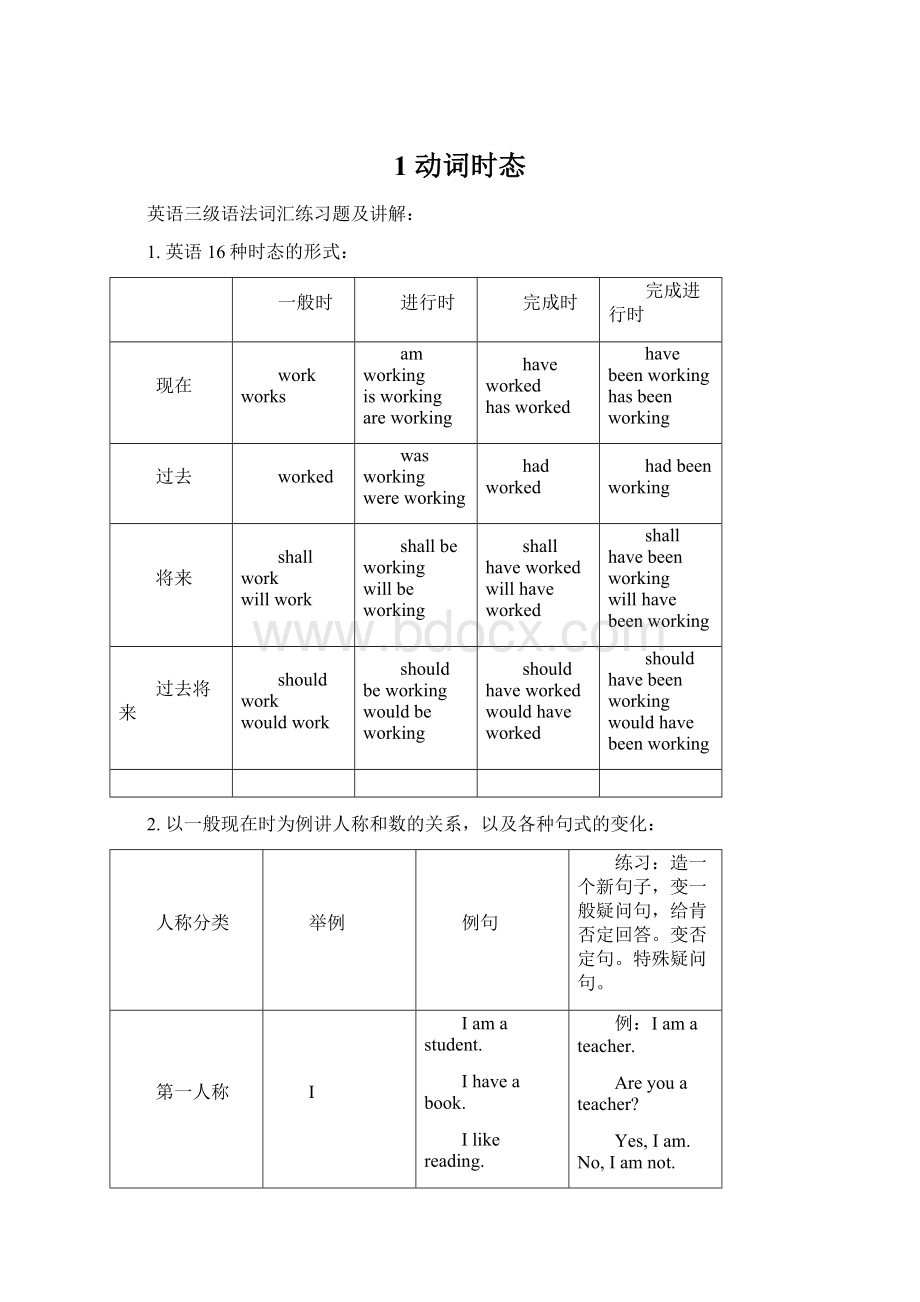1 动词时态.docx
《1 动词时态.docx》由会员分享,可在线阅读,更多相关《1 动词时态.docx(26页珍藏版)》请在冰豆网上搜索。

1动词时态
英语三级语法词汇练习题及讲解:
1.英语16种时态的形式:
一般时
进行时
完成时
完成进行时
现在
work
works
amworking
isworking
areworking
haveworked
hasworked
havebeenworking
hasbeenworking
过去
worked
wasworking
wereworking
hadworked
hadbeenworking
将来
shallwork
willwork
shallbeworking
willbeworking
shallhaveworked
willhaveworked
shallhavebeenworking
willhavebeenworking
过去将来
shouldwork
wouldwork
shouldbeworking
wouldbeworking
shouldhaveworked
wouldhaveworked
shouldhavebeenworking
wouldhavebeenworking
2.以一般现在时为例讲人称和数的关系,以及各种句式的变化:
人称分类
举例
例句
练习:
造一个新句子,变一般疑问句,给肯否定回答。
变否定句。
特殊疑问句。
第一人称
I
Iamastudent.
Ihaveabook.
Ilikereading.
例:
Iamateacher.
Areyouateacher?
Yes,Iam.No,Iamnot.
Iamnotateacher.
Whatareyou?
we
Wearedoctors.
Wehaveathree-bedroomapartment.
Weworkinthesamecompany.
第二人称
you
Youareanicegirl.
Youhaveagoodjob.
Yougetupat6:
30.
you
Youaregoodfriends.
Youhavemanystudents.
YouallliveinBeijing.
第三人称
he
Heisnobody.
Hehasahappyfamily.
Hedoesexerciseseverymorning.
she
Sheisverykind.
Shehasalovelydaughter.
Shedrivestoworkeveryday.
it
Itiscute.
Ithasalongtail.
Itrunsveryfast.
Mary
Maryissweet.
Maryhaslovingparents
MarystudiesinBeijingTVCollege.
they
Theyarecolleagues.
Theyhavealotofmoney.
Theyknowmewell.
3.时态
1)一般现在时
①表示客观存在,通常不受时间限制;或者表示习惯性的动作或状态,此时句子中经常出现时间状语:
always,usually,regularly,everymorning/night/evening/day/week,often,sometimes,occasionally,fromtimetotime,twiceaweek,rarely,seldom,onceamonth,hardly,ever,never,等。
e.g.Ileavehomeforschoolat7:
00everymorning.
②表示主语具备的性格、能力、特征和状态。
e.g.Idon'twantsomuch.
AnnWangwritesgoodEnglishbutdoesnotspeakwell.
③表示客观事实和普遍真理。
e.gTheearthmovesaroundthesun.
ShanghailiesintheeastofChina.
④在时间状语从句和条件状语从句中,常用一般现在时代替将来时。
“主将从现”:
e.g.I’llgowithyouassoonasIfinishmywork.
Idon’ttalktohimunlessheapologizestome.
⑤表示预先计划或安排好的行为。
e.g.Whatcomeonnext?
Suppsewegohikingtomorrow.
⑥有些表示状态和感觉的动词表示现在发生的具体行为时,只用一般现在时,而不用进行时态。
一些表示拥有和存在的词,如:
be、have、exist、own、seem、mean等;表示直觉的词,如:
feel、hear、see、notice、smell、taste等;表示思维的词,如:
agree、believe、understand、see、forget、remember等通常用一般时态。
e.g.Ifeelgoodnow.
Iagreewithyou.
⑦用于格言、谚语中。
e.gPridegoesbeforeafall.
骄者必败。
●一般现在时动词第三人称单数的变化规则:
1、一般情况下,动词后直接加s,
如:
works,gets,reads等。
2、以s,x,ch,sh或o结尾的动词,在后面加es,
如:
goes,teaches,washes等。
3、以辅音字母加y结尾的动词,把y变为i,再加es,
如:
study--studies,try--tries,carry--carries等。
4、动词have遇在主语是第三人称单数时,have改为has,
如:
Hehasaninterestingbook.
5、动词be遇有主语是第一人称单数时,be改为am,遇有主语是第二人称时,be改为are,遇有主语是第三人称单数时,be改为is。
Exercise1:
TranslatethefollowingChineseintoEnglish:
1.我们偶尔会去看歌剧。
2.爱叫的狗不咬人。
3.俗语说,时间就是金钱。
4.谚语所说,后悔药难吃。
5.你们记得他很好客。
6.这个单词是什么意思?
7.我闻到什么东西烧焦的味道。
8.柠檬吃起来有些酸。
9.小费现象不应该存在。
10.老板不在时谁来管理?
11.坚持不懈,直到成功。
AnswerkeystoExercise1:
1.Wegototheoperanowandthen.
2.Barkingdogsseldombite.
3.Astheproverbgoes,timeismoney.
4.Itisnousecryingoversplitmilk,astheproverbsaid.
5.Yourememberhisfabuloushospitality.
6.Whatdoesthiswordmean?
7.Ismellsomethingburning.
8.Lemonstasteacid.
9.Tipsshouldnotexist.
10.Whowillmanagewhilethebossisaway?
11.IwillpersistuntilIsucceed.
2)现在进行时:
①现在(说话的瞬间)正在进行或发生的动作,强调“此时此刻”。
e.g.Heisreading.Theyaretalkingnow.
②当前一段时间内的活动或现阶段正在进行的动作。
e.g.Theyareworkingthesedays.
③某些动词的现在进行时,表预定的计划或即将发生的动作。
e.gIamcoming.
●其结构为be+现在分词.现在分词的变法有
①一般在动词词尾加上-ing,E.g.jump
②以不发音字母e结尾的动词,先去e,再加-ing.E.ghave write
③以重读闭音节末尾只有一个辅音字母结尾的词,它前面是单个元音字母时要先将词尾的辅音字母双写,再加上-ing.
e.g.sitput
Exercise2:
Changethefollowingverbsintotheirpresentparticiples:
(1)run
(2)put
(3)get
(4)win
(5)die
(6)begin
(7)lie(说谎)
(8)lie(躺)
(9)shop
(10)refer
(11)spin
(12)stop
(13)slam
(14)occur
AnswerkeystoExercise2:
(1)running
(2)putting
(3)getting
(4)winning
(5)dying
(6)beginning
(7)lying
(8)lying
(9)shopping
(10)referring
(11)spinning
(12)stopping
(13)slamming
(14)occurring
Exercise1:
TranslatethefollowingChineseintoEnglish:
1.现在下雪了吗?
2.此刻她正在和她的丈夫吵架。
3.他们现在分居了。
4.目前她在替我们管家。
5.她总是抱怨生活。
AnswerkeystoExercise1:
1.Isitsnowingnow?
2.Atthismomentsheisquarrelingwithherhusband.
3.Theyarenowlivingseparately.
4.Sheiskeepinghouseforusatpresent.
5.Sheisalwayscomplainingaboutlife.
3)现在完成时:
①现在完成时的用法1:
表示过去发生或已经完成的某一动作对现在造成的影响或结果。
此时,常与时间副词already(已经),yet(还、已经),just(刚刚、仅仅),ever(曾经),never(从不),before(以前)等连用。
这几个副词的用法如下:
e.g.I'vealreadyreadthisbook.
我已经读过这本书了。
I'vewashedmyclothesalready.
我已经洗了衣服。
Haveyoumethimalready?
你(真的)已经见过他了?
—Hashefoundhiswatchyet?
他已经找到他的手表了吗?
—No,notyet.
不,还没有。
Thewomanhasn'tfoundherdogyet.
那位妇女还没有找到她的狗。
Hehasjustcomebackfromschool.
他刚从学校回来。
HaveyoueverbeentoHongKong?
你曾去过香港吗?
Ihaven'teverspokentoher.
我未曾和她说过话。
Ihavenevertravelledbyplanebefore.
我以前从来没有乘飞机旅行过。
HaveyoubeentoHainanbefore?
你以前去过海南吗?
Ihaven'teatenGuangdongfoodbefore.
我以前没吃过广东菜。
②持续性用法(肯定句,疑问句中谓语动词必须是延续性动词):
表示过去已经开始,持续到现在的动作或状态。
此时常与“for+一段时间或“since+过去的点时间或从句(从句用一般过去时)以及sofar(到目前为止)等时间状语连用。
e.g.I'velivedheresince1990.自从1990年以来我就住在这里。
=I'velivedheresince13yearsago.
=I'velivedherefor13years.
=Itis13yearssinceIbegantolivehere.
Ihaven'tseenhimforthreeyears.我三年没有看见他了。
=Ihaven'tseenhimsincethreeyearsago
=Ihaven'tseenhimsince2000.
=Itis3yearssinceIsawhimlasttime.
MrWanghasworkedinthefactorysincehecametothecity.
自从到这个城市以来,王先生一直在这家工厂工作。
She'sbeenatthisschoolsincefiveyearsago.
自从五年前以来她就在这个学校。
Exercise1:
TranslatethefollowingChineseintoEnglish:
1.我们刚碰到了一位多年不见的老朋友。
2.您已完成订位。
3.他递交了辞呈,决定离开。
4.你已经针对此问题得到结论了吗?
5.我们还没有研究过任何莎士比亚的作品。
6.我真是从未遇见过像你这么挑剔的顾客。
7.我从未看到飞机加起速来如此地快。
8.你今天有没有列计划?
9.自我上次听了那位政治家的讲演后,他在我心中变崇高了。
10.我这辈子从没听过这种废话!
11.我一生都想做一个诚实的人。
12.我今天好忙。
13.我从来没有去过日本。
14.她去打水去了。
AnswerkeystoExercise1:
1.We'vejustcomeacrossanoldfriendwehaven'tseenforages.
2.Nowyouhavebeenbooked.
3.He'salreadygiveninhisresignationanddecidedtoleave.
4.Haveyouformedanopiniononthisproblemyet?
5.Wehaven'tdoneanyShakespeareyet.
6.You'rereallythemostparticularcustomeri'veevermet.
7.Ihaveneverseenanairplaneacceleratesofastbefore.
8.Haveyoumadeplanningtoday?
9.ThatpoliticianhascomeupinmyopinionsinceIheardhislastspeech
10.NeverinallmylifehaveIheardsuchnonsense!
11.AllmylifeIhavetriedtobeanhonestman.
12.Ihavebeenverybusytoday.
13.IhaveneverbeentoJapan.
14.Shehasgonetofetchwater.
●动词过去式和过去分词的变化规则:
1)基本变化规则:
(1)一般情况下,动词词尾加ed,
如:
work-worked play-played want-wanted act-acted
(2)以不发音的e结尾动词,动词词尾加d,
如:
live-lived move-moved decide-decided raise-raised
(3)以辅音字母+y结尾的动词,把y变为i再加-ed,
如:
study-studied try-tried copy- copied cry-cried carry-carried
(4)以一个辅音字母结尾的重读闭音节动词,双写词尾辅音字母,再加ed,
如:
stopped begged dropped planned dripped
2)不规则变化规律总结(按照动词原型、过去式和过去分词的顺序):
(1)A---A---A型
let-let-let
hurt-hurt-hurt
read-read-read
A---A---B型
beat-beat-beaten
A---B---A型
run-ran-run
come-came-come
A---B---B型
make-made-made
have-had-had
a.在动词原形后加d构成过去式和过去分词
hear-heard-heard
lie-lied-lied
b.词尾有ild和end的动词,只需把d变为t构成过去式或过去分词
build-built-built
send-sent-sent
c.改变动词原形中的元音字母:
将i改为a、o、u等
sit-sat-sat
win-won-won
stick-stuck-stuck
d.某些以ay结尾的动词,其过去式和过去分词是把ay变成aid
pay-paid-paid
say-said-said
e.某些以eep结尾的动词,其过去式和过去分词是把eep改为ept
keep-kept-kept
sleep-slept-slept
f.某些以ell结尾的动词,其过去式和过去分词是把ell改为elt/old,或在原形后加ed
sell-sold-sold
smell-smelt-smelt
(5)A---B---C型
a.在动词原形后加n或en
show-showed-shown
drive-drove-driven
give-gave-given
b.重读音节中的元音字母i分别为a(过去式)和u(过去分词)
sing-sang-sung
begin-began-begun
swim-swam-swum
Exercise2:
Changethefollowingverbsintotheirpastparticiples:
(1)come
(2)think
(3)run
(4)tell
(5)put
(6)break
(7)get
(8)forget
(9)speak
(10)marry
(11)spend
(12)transfer
(13)bite
(14)find
(15)found
(16)have
(17)cost
(18)take
(19)sleep
(20)pay
(21)hold
(22)be
(23)make
(24)buy
(25)begin
(26)apply
(27)eat
(28)drive
(29)do
(30)beat
(31)choose
(32)say
(33)see
(34)go
(35)keep
(36)give
(37)feel
(38)hurry
(39)try
(40)reply
(41)injury
(42)say
(43)ring
(44)sing
(45)write
(46)understand
(47)read
(48)spread
(49)mean
(50)can
(51)may
(52)will
(53)shall
(54)become
(55)hear
(56)rise
(57)arise
(58)lead
(59)build
(60)regret
(61)think
(62)study
(63)know
(64)sink
(65)imply
(66)choose
(67)leave
(68)satisfy
(69)infer
(70)bear
(71)sit
(72)meet
(73)lose
(74)stand
(75)bring
(76)send
(77)transmit
(78)deal
(79)drink
(80)spin
(81)lie(躺)
(82)lay
(83)stop
(84)fly
(85)grow
(86)fall
(87)prefer
(88)sell
(89)cancel
(90)vary
(91)occur
(92)dream
(93)teach
(94)catch
AnswerkeystoExercise2:
(1)comecamecome
(2)thinkthoughtthought
(3)runranrun
(4)telltoldtold
(5)putputput
(6)breakbrokebroken
(7)getgotgot
(8)forgetforgotforgotten
(9)speakspokespoken
(10)marrymarriedmarried
(11)spendspentspent
(12)transfertransferredtransferred
(13)bitebitbitten
(14)findfoundfound
(15)foundfoundedfounded
(16)havehadhad
(17)costcostcost
(18)taketooktaken
(19)sleepsleptslept
(20)paypaidpaid
(21)holdheldheld
(22)bewas/werebeen
(23